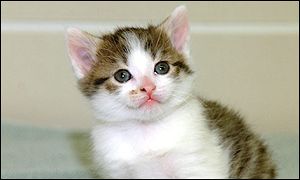First pet clone is a cat

This
is CopyCat: the first cat clone
Friday,
15 February, 2002, 12:08 GMT Researchers in Texas
have cloned a domestic cat, producing a two-month-old kitten called CopyCat.
The
work is described in the scientific journal Nature and is the first time anyone
has cloned a pet. CopyCat, or Cc for short, is a copy of her genetic
mother, not of the tabby surrogate cat that actually gave birth to her. The
cloned cat "appears healthy and energetic", say researchers at Texas
A & M University. The Texas laboratory has already cloned a pig, bull
and goat. Work is underway to clone a dog. Mark Westhusin, a member of
the cloning team, said there were serious scientific reasons for cloning a cat.
Dr Westhusin said: "Cats have a feline AIDS that is a good model for
studying human AIDS." Ethical alarm Animal welfare groups
have voiced concern over the experiments. Cats Protection, a UK feline
welfare charity, said cloning was not the answer to replacing a lost pet. Chief
Executive Derek Conway said: "The cloning of cats interferes with nature
and raises serious questions concerning whether a pet can ever be truly replaced."
Previous animal cloning experiments have concentrated on livestock and
laboratory animals with a view to duplicating expensively created transgenic animals.
Such animals have been genetically modified to make them produce valuable
drugs in their milk or to make them potentially suitable for organ transplants.
Rescue dogs CopyCat is the only surviving animal of 87 kitten
embryos created by cloning. The success rate will have to improve if pet
cloning is to become a reality. According to the Wall Street Journal, the
cloning experiments were funded by an 81-year-old financier called John Sperling,
who wants to charge wealthy pet owners to clone their animals. He was quoted
by Reuters news agency as saying that he would also like to see cloning used for
socially useful animals such as rescue dogs.
| 





